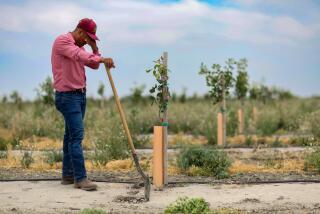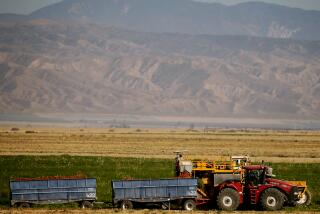Mobile Irrigation Lab Helps Residents : Camarillo: County service designed for farmers is alerting homeowners’ groups to wasteful water-use practices.
- Share via
A county-funded irrigation laboratory designed to help farmers save water has begun providing its services for Camarillo residents trying to prevent their lawns from dying in the drought.
Operators of the free mobile irrigation management laboratory, which has functioned as a farmers’ soil and irrigation consulting source for four years, say interest in conservation has picked up among homeowner groups because of mandatory water cutbacks.
Representatives of homeowner groups who subscribe to the service say that testing their turf has opened their eyes to wasteful practices, such as misaligned sprinklers, runoff and over-watering.
At one Camarillo housing tract, the mobile lab found that 39% of the water used to irrigate a median strip had trickled into the street, homeowner Bill Torrence said.
“I was astounded we were wasting water,” said Torrence, chief financial officer for the Camarillo Springs Master Common Area Assn., which manages about 90 acres of lawns now subject to water cutbacks of 30%.
Until recently, only commercial farmers and professional landscapers were interested in the mobile lab’s services, said Lee Waddle, who heads the three-member crew.
About 75% of the 200 clients who asked to have their irrigation systems analyzed in the past three years were farmers, Waddle said. Most of the other requests came from cities, park districts and landscapers.
Until last year, only four homeowner groups had requested the lab’s services, he said. So far this year, the lab has conducted tests for three homeowner groups. Lack of staff members precludes the lab from doing more, Waddle said.
Waddle said homeowner groups are requesting the information because of increasing water bills and more stringent restrictions on water usage. Most individual homeowners don’t know how to irrigate their lawns efficiently, and maintenance crews lack the skills and time to uncover waste, he said.
“Most of the time you get the ‘mow, blow and go’ guy,” he said. “He doesn’t care.”
To teach homeowners about their lawns, Waddle simplified a 25-page irrigation manual into a 15-page handbook that helps them evaluate sprinkler systems and calculate watering schedules. In a typical test, conical cups are placed on a lawn and the sprinklers turned on for 10 minutes. The amount of water spray that ends up in the cups shows homeowners how much and how evenly water is distributed. The whole process takes about two hours.
The same field test is conducted for commercial turf farmers, such as Pacific Sod in Oxnard. But it is still an uncommon sight in residential neighborhoods, said Luke Crawford, an irrigation technician who conducts the field tests.
“Some people wonder what we’re doing,” Crawford said. “It looks like we’re mixing drinks.”
After the field tests, the lab conducts computer calculations and issues a full report, detailing irrigation schedules and weaknesses in the sprinkler system, Waddle said.
Homeowners in Leisure Village in Camarillo learned they had poor water distribution after the mobile lab had inspected their lawns, Maintenance Superintendent Terry Craig said.
Craig said similar landscaping services normally cost more than $70 an hour, but since it is never billed, Leisure Village continues to ask for yearly audits from the mobile lab.
“By correcting those problems, we have managed to save 10% to 15% a year compared to five years ago,” he said. Leisure Village saved about $20,000 each year, he said.
Few of the 870 homeowners in the Camarillo Springs development were conscientious about conserving until mandatory water-use restrictions were imposed by the city and the possibility of cutbacks loomed, Torrence said.
After the mobile lab’s data revealed a third of the 6,000 gallons of water sprayed weekly on one local median divider strip was being wasted, maintenance crews were ordered to tear out the grass and replace it with drought-resistant shrubs, he said.
Although some people complained, Torrence said the lab’s consultants armed him with information to persuade neighbors that drastic measures are needed.
“I’ve never done any farming, but I’m smart enough to recognize there are people who have the knowledge and to listen to them,” he said.
More to Read
Sign up for Essential California
The most important California stories and recommendations in your inbox every morning.
You may occasionally receive promotional content from the Los Angeles Times.













